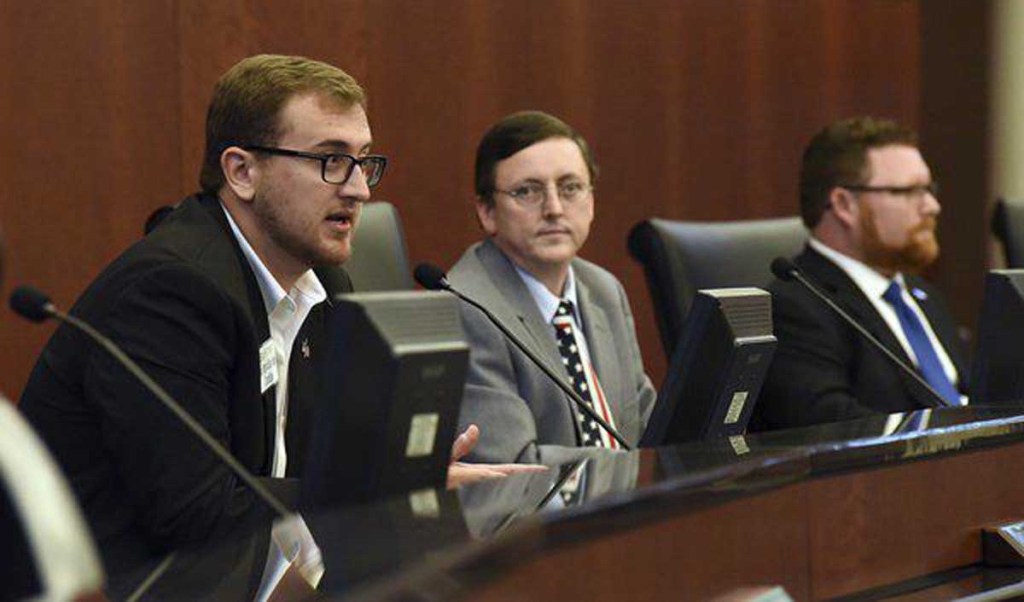Differences emerge among candidates for state House District 4 on medical marijuana, Medicaid, other issues
Published 10:31 am Friday, October 13, 2017

- From left, Beau Patton, Eddie Caldwell and Peter Pociask answer questions during a candidates forum on Thursday. The three are running in the Nov. 7 special election for state House of Representatives District 4.
DALTON, Ga. — Georgia law currently allows hospice patients and those suffering from illnesses such as cancer, Parkinson’s disease and Alzheimer’s to use cannabis oil.
Two candidates in the Nov. 7 nonpartisan special election for state House of Representatives District 4 said Thursday night they support expanding upon that program, possibly even legalizing medical marijuana in Georgia.
“I believe that when it comes to treatment, that should be a decision between the patient and the physician,” said Eddie Caldwell, vice president of American Carpet Wholesalers, who identified himself as a Republican when qualifying.
According to Governing magazine, medical marijuana is legal in 22 states and the District of Columbia, and another seven states have legalized marijuana for recreational use.
Computer programmer Peter Pociask, who identified as a Democrat, pointed to the experiences of those states and other countries that have either legalized medical marijuana or completely legalized marijuana use.
“If you look at those places, they haven’t had the problems that many people feared they would have,” he said.
But Republican Party activist Beau Patton noted the federal Drug Enforcement Administration classifies marijuana as a schedule 1 drug, the most tightly restricted category, and legalizing it for even medical uses would put the state in conflict with federal law and policy.
“I just worry about what would happen with two very different sets of laws and policies,” he said.
The three spoke before about 100 people at a forum at Dalton City Hall hosted by the Daily Citizen-News and the League of Women Voters of the Dalton Area. The fourth candidate in the race, Oakwood Cafe and Cherokee Pizza and Brewing Co. owner Kasey Carpenter, did not attend, citing a previous family commitment. District 4 covers almost all of the city of Dalton as well as four adjacent precincts. The position became open in September when Bruce Broadrick, a Republican from Dalton, stepped down for health reasons.
Medical marijuana wasn’t the only issue the three differed on.
Pociask supports expanding eligibility for Medicaid, the joint federal-state program that provides health care for the poor. He noted that Obamacare provides money to fund such an expansion.
“We’ve left that money on the table,” he said.
He said it would also help hospitals with the issue of providing treatment to patients who cannot afford to pay.
“When someone doesn’t pay, we all pay with higher medical costs,” he said.
But Caldwell said increasing funding for Medicaid could crowd out other state spending.
“It sounds good, but we just can’t afford it,” he said.
Patton said he does not support Medicaid expansion but could support finding ways to improve health care for veterans.
The three also differed on the Religious Freedom Restoration Act. The federal government passed such a law by unanimous consent in the House of Representatives and near-unanimous consent in the Senate in 1993. A version of that bill passed the state Legislature in 2016, but Gov. Nathan Deal, who voted for the federal law when he served in Congress, vetoed the measure under pressure from major corporations.
Caldwell said he could support a bill that mirrored the federal law.
“That law says that if the government has a law or regulation that infringes on someone’s religious liberty it must show that it meets a vital government interest and that there is no way to serve that interest that is less restrictive of religious liberty,” he said.
Patton said such a law would protect small business owners.
“Religious freedom is one of our most important rights, and people should not lose that right when they go into business,” he said.
Pociask said he has concerns about such a law.
“We all support religious freedom,” he said. “But does religious freedom give us the right to refuse someone who doesn’t share our religious values?”





